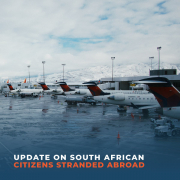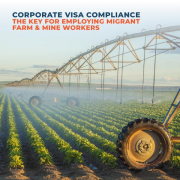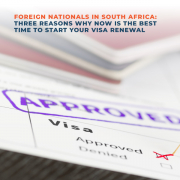The negative consequence of this belief is that if one does nothing now, you will be faced with an immense backlog that the Department of Home Affairs (DHA) and the VFS is expected to deal with post-lockdown; and you do not want to be found on the wrong side of an expired work visa.
Below a few key reasons to get started right away –
1. Be proactive – Get ahead of the queue
While applications cannot be filed during lockdown, expats and their employers must use this time to prepare these applications and book an appointment to ensure applications can be filed as soon as possible after lockdown has been lifted.
Preliminary feedback from the latest Xpatweb 2020 Work Visa Risk Impact Survey shows that 70% of expatriate employers in SA have employees with visas that have already expired, or are due to expire soon, thus indicating there will be a flood of applications to Home Affairs post-lockdown.
Some proactive planning will ensure you are ahead of the rush.
2. Upon Upliftment, you will again be forced to travel for renewals
Certain classes of visa renewals, such as –
- intra-company transfer work visas,
- corporate visa holders, and
- short term business or work visas;
will require travel back home for renewal. However special dispensations have been made available to assist these visa holders who cannot travel due to international travel bans.
When travel restrictions are lifted, the special dispensation will cease, and expatriates will be forced to travel back for their visa renewal. Getting your extension in South Africa under the current special dispensation means a significant saving in cost and time, as well as not being forced to travel at an inconvenient time and removes the uncertainty that comes with visa renewals in certain foreign countries.
3. Uncertain future of work visas
In these unprecedented times, many processes are fast changing. This causes uncertainty of what will be required going forward, including the possibility of needing health certificates and/or being forced to quarantine for an extended period of time. Until the special dispensations are revoked, you operate in a very clear cut and well administered system, provided you follow the rules and regulations.
Additional considerations to take into account include –
Review your current work visa category
The main reason to change your work visa status is to fall into a better category. This generally refers to a category which allows longer or indefinite stay, or which grants you access to permanent residency or South African citizenship status. The current environment is ideal for a discussion on an immigration expert on the categories available and how to optimally plan your future.
Avoid being a victim of Work Visa Malpractice
There are many foreigners who have fallen foul of immigration malpractice by unscrupulous advisors, as the advisor is in a position of trust. One scheme is where a visa category is advised which is well known will cause considerable delays or will never be issued. Payment is charged upfront. Then additional payments are demanded or the ‘ball is kicked down the road’ when you enquire on your application status, with the Department of Home Affairs unfairly blamed. Often this comes with the promise of special contacts or forever a great excuse why there are no results. There are formal processes in place to determine your status and see whether what has been advised is the truth. Where you have a feeling something is not right, your instincts are normally correct.
An approach of prudence and urgency is to be encouraged to avoid later disruptions.
Closing remarks
Now is the opportune time to start your visa renewal process. This prevents being caught in an expected rush later when restrictions are lifted, or processes adjusted to accommodate the different levels of restriction. A proactive approach will stand business in good stead to resume activities and focus on core business items rather than expatriate compliance.
AUTHOR

Marisa Jacobs
Director





